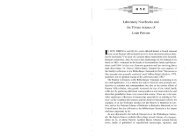Ideas for a Philosophy of Nature
Ideas for a Philosophy of Nature
Ideas for a Philosophy of Nature
You also want an ePaper? Increase the reach of your titles
YUMPU automatically turns print PDFs into web optimized ePapers that Google loves.
38 <strong>Ideas</strong> <strong>for</strong> a <strong>Philosophy</strong> <strong>of</strong>Na.. eBut now beyond and above <strong>Nature</strong>, in the ordinary notion <strong>of</strong> it,nothing higher is acknowledged than mind.» However, if we nowwant to conceive the Life-<strong>for</strong>ce as a spiritual principle, then we totallyabolish that concept in so doing. For <strong>for</strong>ce means what, at least as aprinciple, we can put at the apex <strong>of</strong> natural science, and what, althoughnot itself presentable, yet, in the way it works, is definable by physicallaws. But how a mind can act physically we have not the slightest idea;<strong>for</strong> that reason also, a mental principle cannot be called Life-<strong>for</strong>ce, anexpression by which one always at least suggests the hope <strong>of</strong> allowingthat principle to work according to physical laws.>''But if we <strong>for</strong>go, as we are then compelled to do, this concept (<strong>of</strong> aLife-<strong>for</strong>ce), we are now obliged to take refuge in a completely antitheticalsystem, in which at once mind and matter stand opposed to eachother, regardless <strong>of</strong> the fact that we now understand how mind affectsmatter as little as we could previously understand how matter affectsmind.Mind, considered as the principle <strong>of</strong> life, is called soul. I shall notrepeat the objections that have long since been brought against thephilosophy <strong>of</strong> the dualists. It has hitherto been contested <strong>for</strong> the mostpart from principles which had as little content as the contested systemitself. We do not ask how in general a connection is possiblebetween soul and body (a question to which one is not entitled, becausethe questioner himself does not understand it) but rather-whatone can understand and must answer- how the idea <strong>of</strong> such a connectionhas arisen in us. That I think, imagine, will, and that this thinking,etc., can so little be a result <strong>of</strong> my body, that on the contrary the latteronly becomes my body through these capacities to think and to will, Iknow full well. Let it meanwhile be permitted, moreover, <strong>for</strong> the sak<strong>of</strong> speculation, to distinguish the principle <strong>of</strong> motion from the moved,the soul from the body, despite the fact that as soon as the talk is <strong>of</strong>action we completely <strong>for</strong>get this distinction. Now with all these assumptions,at least this much is obvious, that if there is in me life and soulthe last as something distinct from the body, I can become aware 0either only through immediate experience. That I am (think, will, etc.)is something that I must know, if I know anything at all. Thus I'5 Now we know nothing higher, <strong>for</strong> which <strong>for</strong>ces as such could exist, than Spirit; <strong>for</strong>only Spirit can represent to itself <strong>for</strong>ces and equilibrium or conflict <strong>of</strong> <strong>for</strong>ces.[First ediiion.],,' This one sees very clearly from the utterances <strong>of</strong> many defenders <strong>of</strong> the Life-<strong>for</strong>ce.Herr Brandis, <strong>for</strong> example (in his Experiments Oil the Life-<strong>for</strong>ce, #81), asks, "Shouldelectricity (which seems to cooperate in phlogistical processes generally) also participatein the phlogistical life-processes (which the author assumes), or mightelectricitybe the life-<strong>for</strong>ce itself? I consider it more than likely,"Introduction 39stand how an idea <strong>of</strong> my own being and life arises in me, beifI understand anything whatsoever, I must understand this.because I am immediately aware <strong>of</strong> my own being, the inferenceul in me, even if the conclusion should be false, at least rests onubitable premise, that I am, live, imagine, will.how do I now come to transfer being, life, etc., to things outsideor just as soon as this happens, my immediate knowledge isted into mediate. But now I maintain that there can be only anuue knowledge <strong>of</strong> being and life, and that what is and lives only isives ins<strong>of</strong>ar as it first and <strong>for</strong>emost exists <strong>for</strong> itself, is aware <strong>of</strong> itsrough being alive. Suppose, then, that there appears to me inrception an organic being, freely self-moving, then I certainlythat this being exists, that it is <strong>for</strong> me, but not that it exists<strong>for</strong> itself. itself. For life can as little be represented outside life as connessoutside consciousness.» So even an empirical conviction-smething lives outside me is absolutely impossible. For the Idealsaythat your representing to yourself organized, free, selfgbodies canjust as well belong simply to the necessary peculiarifyour faculty <strong>of</strong> representation; and even the philosophy whichws life on everything external to me does not permit the idea <strong>of</strong>e outside me to come into me from outside.if this idea arises only in me, how can I be persuaded that. g corresponds to it outside me? It is also obvious that I amaded <strong>of</strong> a life and self-existence outside me only practically. Iin practice be compelled to acknowledge beings outside me, whoe me. If I were not compelled to enter into the company <strong>of</strong>outside me and into all the practical relationships associatedat; if I did not know that beings, who resemble me in externaland appearance, have no more reason to acknowledge freedomentality in me than I have to acknowledge the same in them; in.~ I were not aware that my moral existence only acquires purnddirection through the existence <strong>of</strong> other moral beings oute,then left to mere speculation, I could <strong>of</strong> course doubter humanity dwelt behind each face and freedom within eacht. All this is confirmed by our commonest judgements. Only <strong>of</strong>'S external to me, who put themselves on an equal footing withlife, between whom and myself giving and receiving, doing anding, are fully reciprocal, do I acknowledge that they are spiritualracter. On the other hand, if the rather curious question isht up, whether animals also have souls, a person <strong>of</strong> commonacobi's David Hume [Breslau, 1787], p. t40'eoretical [First edirion.]



